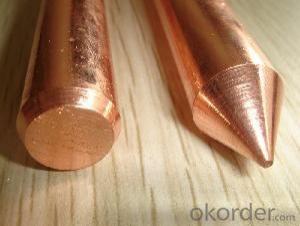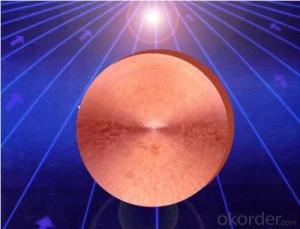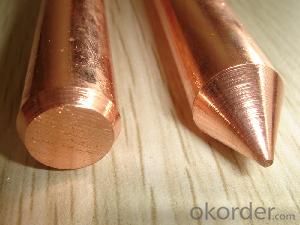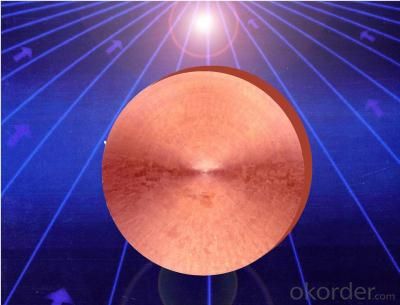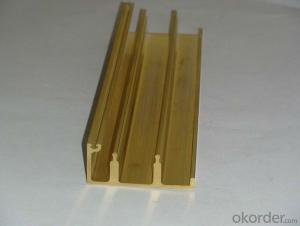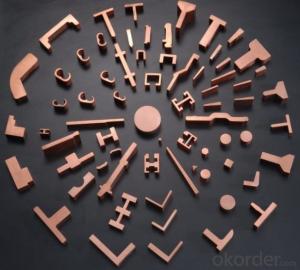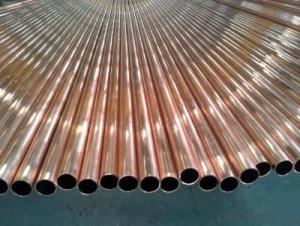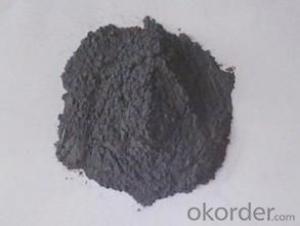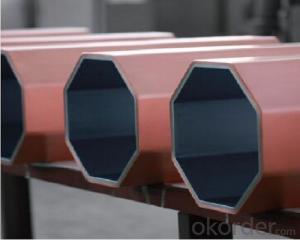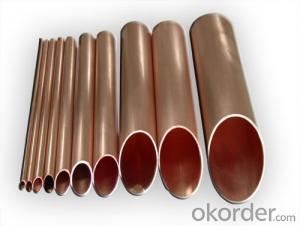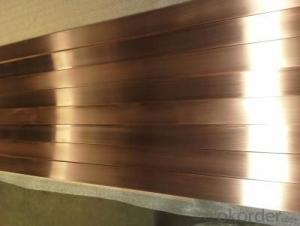High density Purified Copper Alloy Ingot Casting for Steelmaking
- Loading Port:
- Shanghai
- Payment Terms:
- TT OR LC
- Min Order Qty:
- 500 kg
- Supply Capability:
- 10000 kg/month
OKorder Service Pledge
OKorder Financial Service
You Might Also Like
Product: High density copper alloy ingot
Type Specifications: T2, TU1, TU2, TP2
Produced by low-vacuum copper smelting casting technology with its intellectual property right owned by Feichi Copper & Aluminum; high density and high purity product with low hydrogen and oxygen content, usually processed into copper products of various shapes and widely applied in steelmaking, electric power, shipbuilding, and machinery sectors
Application:
Produced by low-vacuum copper smelting casting technology with its intellectual property right; high density and high purity product with low hydrogen and oxygen content, usually processed into copper products of various shapes and widely applied in steelmaking, electric power, shipbuilding, and machinery sectors
Special Shaped tungsten products
We produce special shaped tungsten products and other OEM products.
Production Equipment
750-1500kg main frequency induction copper melting furnace, 80MN water seal extruder, LG60 high speed two-roll cold pilger mill, straight-line wire-drawing machine, copper tube/pipe straightener, polisher, 84′ copper coil winding machine, straightening-cutting & pancake coiling machine, thermoplastic packaging machine, 1.2T continuous bright annealing furnace.

80MN extruder

Continuous bright annealing furnace
Testing Devices
spectrum analyzer, atomic absorption analyzer, spectrophotometry, analytical balances, metallurgical microscope, eddy current flaw detector, metal tensile testing machine, eddy conductivity instrument.

Hardness tester

Spectrum analyzer

Metallurgical microscope

Metal tensile testing machine

Atomic absorption analyzer
Process
refined copper — smelting & casting — extrusion — rolling — drawing — straightening-cutting/forming of pancake coil — bright annealing — packaging — finished goods.
Standards
GB/T 1527-2006 Drawn tube of copper and copper alloys
GB/T 16866-2006 Dimensions and tolerances of copper and copper alloy seamless tubes
GB/T 4423-2007 Copper and copper-alloy cold-drawn rod and bar
GB/T 5231-2001 Wrought copper and copper alloys chemical composition limits and forms of wrought products
GB/T 5585.1-2005 Copper or aluminium and its alloy bus bars for electrical purposes—Part 1:Copper andcopper alloy bus bars
GB/T 17791-2007 Seamless copper tube for air conditioner and refrigeration equipment
GB/T 19850-2005 The seamless round copper tubes for electrical purposes
GB/T 26024-2010 Seamless copper and copper alloys tube for valves on air-conditioning and refrigeration system
ASTM B280-2008 Standard Specification for Seamless Copper Tube for Air Conditioning and Refrigeration Field Service
EN 12735-1:2001 Copper and copper alloys Seamless,round copper tubes for air-conditioning and refrigeration Part 1:Tubes for piping systems
EN 12735-2:2001 Copper and copper alloy – seamless round copper tube/pipe for air-conditioning and refrigeration system – for equipment
JIS H3300-2009 Seamless copper and copper alloy tube/pipe
- Q: I‘m making a copper-pipe xylophone for a school project, but all my pipes are one octave too high. Following the formulas I found online, I tried to calculate the lengths necessary for a C4 scale xylophone, but the resulting numbers were ridiculous (55 something inches for C4. T__T) Then, I tried buying thicker pipes to make the sounds lower, but was flabbergasted when the notes actually got higher.The pipes I have right now are 1/2 inch ones (the thinnest pipes in Home Depot. I think), in a C5 Major scale with measurements of 258 mm, 245 mm, 230.5 mm, 223 mm, 210.5 mm, 199 mm, 186.5 mm, and 181.5 mm. (C5, D5, E5, F5, G5, A5, B5, C6)I‘ve searched multiple sites and have not been able to find a solution to this problemo. ;__;Is there any way to alter each pipe that would made them go down an octave? Also, how would one determine the measurement for an F#? Please, please answer if you can; I need the project done by next Friday! lt;3 Thank you so much, I am eternally indebted to youuu!!!!!!!!!!!lt;3:D
- If you close one end of each tube, you will get a resonant frequency of 1/2 what you would get if it were open ended. It drops about 1 octave.
- Q: Chemistry Lab Limiting reactantelements used silver nitrate and copperBefore massing the copper we were told to sand it what is the purpose of this?
- Sanding the copper would remove some of the oxides, and increase surface area, but it would not remove all of the surface contaminants and it would likely introduce new ones. I've never heard of sanding as a laboratory technique. If I wanted a corrosion-free copper surface with lots of surface area I would pickle the copper in acid and then rinse and store in deionized water.
- Q: Copper is also used for pipes, but in the Roman times lead was used for plumbing. What makes both these materials suitable for this use? What makes lead unsuitable?
- lead is poisonous substance where copper is not, both of them could be moulded or hammered in any shape which makes them suitable for making anything.
- Q: What are these copper pipes in my attic?
- Probably for heating, don't worry about them unless they have a liquid in them.
- Q: Is there anything I can do w/o a plumber? I have the water turned off to the whole house and don't really want to leave it off until tomorrow.
- Unless you can access the rear and plug off the supply pipe(s), you are gonna be without water until you get a plumber! Can't say for sure, but you are probably gonna lose some wall to gain access, so you could go ahead and open up the wall to get to the pipes. You could cut them off and solder caps, or even crimp the ends and solder if you are capable of that.
- Q: Write the empirical formula of copper chloride based on the experimental data.Express your answer as a chemical formula.........Trial Volume of copper chloride solution (mL) ....................Mass of filter paper (g) ................................Mass of filter paper with copper (g) A 49.6 ....0.908 1.694 B 48.3 ....0.922 1.693 C 42.2 ....0.919 1.588
- this okorder
- Q: Hi there, I wondering if anyone could come up with a reasonable answer and explanation for this question.Both copper and lead have been used to make water pipes. Which metal would be a better choice?
- COPPER. Lead will result in lead poisoning and mental problems. Never use lead pipe for potable water. TexMav
- Q: But the problem is consuming of copper itself in it's natural form is harmful. I'd like to know how can copper be converted into edible substance, for example, edible copper leaf or dust. What I want to know is how is copper converted into dis-harming consumable element further which can be used in medicine.
- I'm afraid this is impossible. This is because copper is an element and has a specific set of chemical properties which can't be changed. For example, the sulfate salt is blue and can't be made orange and remain the same compound. Copper in fact is an element, which means it can't be changed in any way and remain copper. Granted a soluble copper compound can be made insoluble and less toxic. For example copper sulfate can become copper sulfide when mixed with sodium sulfide. The copper sulfide will be very insoluible and much less toxic than the sulfate. However it might react with stomach acid and form copper chloride which is very soluble and hydrogen sulfide which not only smells bad but is just as toxic. It sounds to me that you are relying on some physical property of copper to supress cancer. I've seen a lot of copper bracelets, but copper has no known physical properties which would supress cancer in any way. Copper is not magnetic or radioactive. Radioactive materials in fact can be used to treat cancer. Perhaps a radio isotope of copper could be used for this purpose. I don't know how safe it would be however. I would definetly not want to wear anything radioactive around my wrist.
- Q: There is a leak in the copper piping, and the solder won't stick. How do I fix this?
- all the answers are correct here. your biggest problem will be draining ALL the water out of the system before replacing the problem fitting where the leak is occurring. i suggest using unions in case you have water problems.
Send your message to us
High density Purified Copper Alloy Ingot Casting for Steelmaking
- Loading Port:
- Shanghai
- Payment Terms:
- TT OR LC
- Min Order Qty:
- 500 kg
- Supply Capability:
- 10000 kg/month
OKorder Service Pledge
OKorder Financial Service
Similar products
Hot products
Hot Searches
Related keywords
